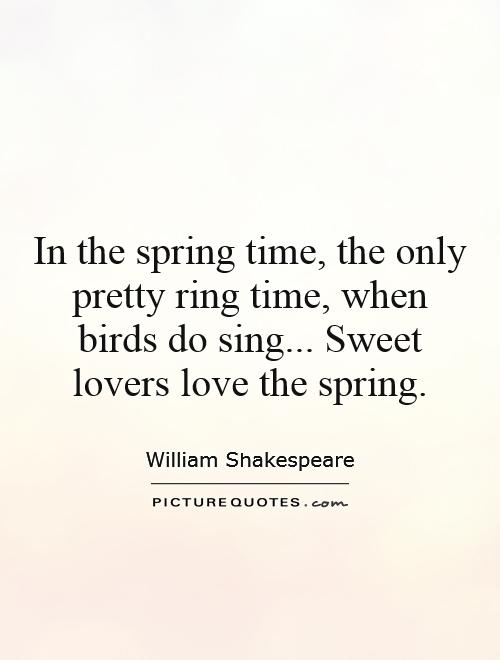In the spring time, the only pretty ring time, when birds do sing... Sweet lovers love the spring

In the spring time, the only pretty ring time, when birds do sing... Sweet lovers love the spring
William Shakespeare, the renowned playwright and poet, often explored the themes of love, nature, and the passage of time in his works. One of his most famous sonnets, Sonnet 98, captures the essence of springtime and the beauty of love in this season. The opening lines of the sonnet, “In the spring time, the only pretty ring time, when birds do sing... Sweet lovers love the spring,” evoke a sense of renewal, growth, and passion that are synonymous with the arrival of spring.Shakespeare uses the imagery of birds singing and lovers embracing to convey the joy and vitality that spring brings. The reference to “sweet lovers” suggests that spring is a time of heightened emotions and romantic connections. The season of spring is often associated with new beginnings and the blossoming of love, making it a fitting backdrop for Shakespeare’s exploration of love and desire.
The phrase “the only pretty ring time” may allude to the circular nature of the seasons, with spring marking the beginning of a new cycle of growth and rebirth. The repetition of the word “ring” also suggests a sense of continuity and interconnectedness, highlighting the cyclical nature of love and life.
Shakespeare’s use of language in these lines is both lyrical and evocative, capturing the sensory experience of springtime. The imagery of birds singing and flowers blooming creates a vivid picture of the natural world coming to life after the cold, dark days of winter. The sonnet as a whole celebrates the beauty and vitality of spring, while also exploring the complexities of love and desire.
Overall, Shakespeare’s depiction of spring in Sonnet 98 is a testament to the enduring power of nature and love. Through his words, he invites the reader to revel in the beauty of the season and reflect on the timeless themes of love and renewal.












 Friendship Quotes
Friendship Quotes Love Quotes
Love Quotes Life Quotes
Life Quotes Funny Quotes
Funny Quotes Motivational Quotes
Motivational Quotes Inspirational Quotes
Inspirational Quotes